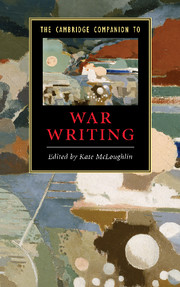Book contents
- Frontmatter
- Introduction
- Part I Themes
- Part II Influences
- Part III Poetics
- 8 Medieval warfare
- 9 Early modern war writing and the British Civil Wars
- 10 The eighteenth century and the romantics on war
- 11 American Revolutionary War writing
- 12 The Victorians and war
- 13 The American Civil War
- 14 The First World War: British writing
- 15 The First World War: American writing
- 16 The Spanish Civil War
- 17 The Second World War: British writing
- 18 The Second World War: American writing
- 19 American writing of the wars in Korea and Vietnam
- 20 The Cold War and the “war on terror”
- Index
18 - The Second World War: American writing
from Part III - Poetics
Published online by Cambridge University Press: 28 January 2010
- Frontmatter
- Introduction
- Part I Themes
- Part II Influences
- Part III Poetics
- 8 Medieval warfare
- 9 Early modern war writing and the British Civil Wars
- 10 The eighteenth century and the romantics on war
- 11 American Revolutionary War writing
- 12 The Victorians and war
- 13 The American Civil War
- 14 The First World War: British writing
- 15 The First World War: American writing
- 16 The Spanish Civil War
- 17 The Second World War: British writing
- 18 The Second World War: American writing
- 19 American writing of the wars in Korea and Vietnam
- 20 The Cold War and the “war on terror”
- Index
Summary
Stories of war display essential cultural concepts, expectations, and self-images more prominently than other kinds of literature. In the extreme situation of war, society demands that its (mostly young) citizens risk their lives for the common good. So conflict becomes the occasion for questioning the validity of those individual and collective values and concepts of self and other in whose name one might die prematurely - especially at moments when victory is uncertain. Thus, the literature of war brings forth models of a nation's (or a people's) “storifying of experience”: acts of “literary sensemaking” (or the lack of it) performed in response to particular historical situations - situations that, effectively, require the suspension of norms crucial in peaceful societies and sanctify the use of collective violence.
American experiences of the Second World War provided ample scope - and need - for storifying. The Japanese attack on Pearl Harbor on December 7, 1941 created a massive consensus in the USA about the moral and political necessity of fighting the Japanese military hegemony in Asia and its fascist European allies. The ensuing conflict saw US armed forces deployed all over the globe - on land, on sea, and in the air - for nearly four years. According to estimates, about fifty million people died from 1939 to 1945 in combat, through bombing, in prisoner-of-war (POW) and concentration camps, or through famine and disease induced by the conflict.
- Type
- Chapter
- Information
- The Cambridge Companion to War Writing , pp. 212 - 225Publisher: Cambridge University PressPrint publication year: 2009

